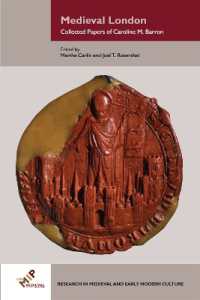- ホーム
- > 洋書
- > 英文書
- > Politics / International Relations
Full Description
Offering an alternative exploration of the subject, 'Marxism in Dark Times' anchors its investigation of Marxism in the conceptual spheres of humanism, democracy and pluralism. Its essays question the stereotyped, positivist notion of the theory as practised by the exponents of official Marxism, highlight the legacy of the suppressed voices in the Marxist tradition, and provide new insights into reading Marxism in the twenty-first century—affording new perspectives on Antonio Gramsci, Rosa Luxemburg, Nikolai Bukharin, David Ryazanov and the Frankfurt School. They seek to review the phenomenon of 'Perestroika,' explore the new historiography on Comintern, and examine the relation between Marxism and postmodernism. With its wide-ranging provision of materials—some translated here into English from German and Russian for the first time—this collection offers a pioneering English assessment of some of the most debatable issues in contemporary Marxism.
Contents
Preface; Acknowledgements; A Note on Translations; List of Abbreviations; Introduction; Part I Marxism: Beyond Dogma, an Alternative Quest; 1. The 'Communist Manifesto' after 150 Years: Some Observations; 2. Rosa Luxemburg's Vision of Socialism: Some Reflections; 3. Antonio Gramsci and the Heritage of Marxism; 4. Contrasting Perspectives of International Communism on the Working Class Movement: 1924-1934; 5. Comintern: Exploring the New Historiography; 6. History's Suppressed Voice: Significance of Nikolai Bukharin's Prison Manuscripts (1937-38); 7. Rosa Luxemburg's Letters as Texts of a New Vision of Revolutionary Democracy and Socialism; 8. Understanding Socialism as Hegemony: Rosa Luxemburg and Nikolai Bukharin; 9. Frankfurt School, Moscow and David Ryazanov: New Perspectives; 10. 'Perestroika' and Socialism: Promises and Problems; Part II Marxism: Challenges and Possibilities in the New Century; 11. Marxism in Dark Times: Rediscovering a Revolutionary Legacy; 12. Re-visioning Socialism in a Plural Age; 13. Marxism, Modernity and History: Towards an Alternative Understanding; 14. Marxism and Postmodernism: Confrontation or Dialogue?; 15. Intellectuals, Knowledge and the Masses: A Question of Pedagogy; 16. Marxism in the 21st Century: Towards a New Understanding?







